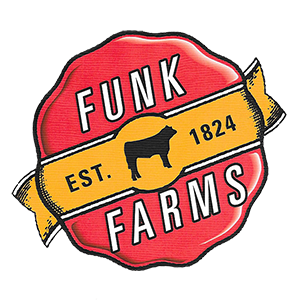Custom Fed

Since the farm was developed in the early 1800's cattle feeding has been a major part of our operation.
The feedlot at Funk Farms is one of the best found in the Midwest. The level of management is superb and the formulation of rations and attention to details is unequaled in Illinois.
Our cattle are fed under the guidance of a certified nutritionist. Feed rations consist of premium quality products based on the age and weight of the cattle. Rations include a balance of haylage, silage, ryelage, dry corn, high moisture corn, wet distillers and finishing supplements.
The current capacity of cattle on feed is 1000 head. The majority of these cattle are housed in a 96' x 560' monoslope, bedded cattle finishing facility. This facility uses corn stalks, and bean straw for bedding and results in a manure pack that can be spread on the crop fields or further composted to a nutrient rich mulch product.
Animal handling and welfare are areas that are stressed here at Funk Farms. The Staff are Certified Livestock Managers by the Illinois Department of Agriculture. The crew follows the management guidelines set forth by the Beef Quality Assurance (BQA) Program so the consumer can be confident in our operations commitment to a quality product. Funk Farms recently participated in a FarmCheck Audit by IMI Global. The animal welfare audits are a welcomed way of verifying the proper practices and protocols we employ for animals and workers in our operation.
It is important for us provide a great environment to house cattle, and utilize rations that allow cattle to express their genetic potential. Likewise it is critical to have outstanding facilities to process and treat cattle. The working tub, alley, directional fans, and hydraulic chute allow cattle to be worked with ease and are located under roof to improve the environment.
Another area of critical importance is the handling of market ready cattle so as to alleviate stress when loaded. To ensure the loading facility would work efficiently and with the least amount of stress on animal and employees, Dr. Temple Grandin, internationally known animal behavior specialist from Colorado State University, was hired to design the facility. To reduce the noise, improve the durability and ease of animal movement, the loading facility was constructed using concrete.
